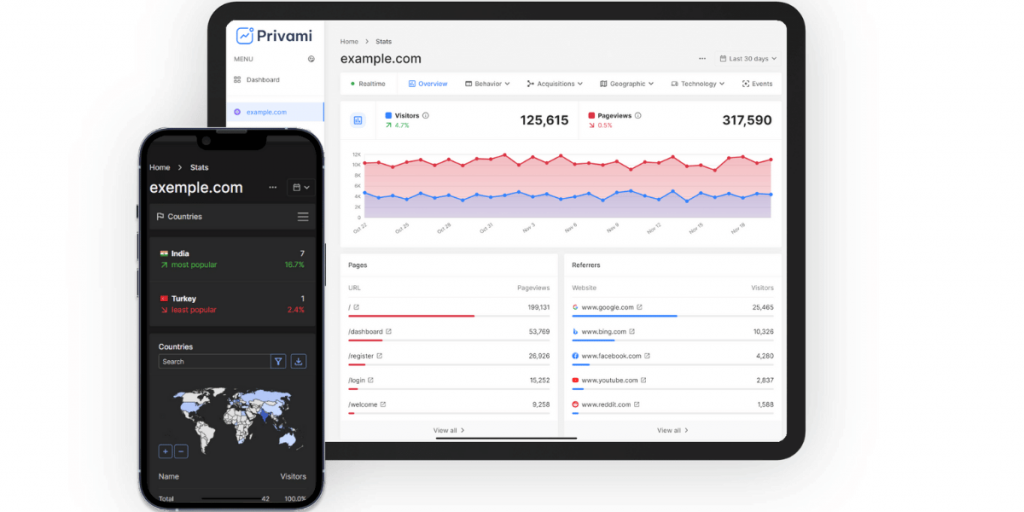
Why stop using Google Analytics ?
The dark side of Google Analytics
The truth about Google Analytics
Google Analytics is often celebrated for providing detailed insights into web traffic and user behavior. However, it harbors a less-discussed side that raises significant concerns. Among the primary issues are privacy and data security, but the worries don’t end there. A notable problem is the over-reliance on Google Analytics as a singular data source, leading to a narrowed perspective in data analysis. This dependency can result in the overshadowing of alternative metrics and insights from other sources, fostering a monoculture in data analytics. Such a monoculture can potentially stifle innovation and obstruct a comprehensive understanding of web dynamics.
The platform’s complexity and lack of user-friendliness present another substantial challenge. For individuals without technical expertise, navigating through the vast array of metrics and features is intimidating. This complexity can lead to misinterpretation or underutilization of the tool’s capabilities.
Impact on user privacy and data protection
The impact of Google Analytics on user privacy and data protection is a multi-faceted and significant concern. This platform goes beyond basic tracking, it accumulates detailed demographic information and browsing patterns, creating comprehensive user profiles. This level of personal data collection, particularly when used for targeted advertising, borders on digital surveillance and raises ethical questions about the extent of user data utilization.
In terms of data management, businesses using Google Analytics face risks due to limited control over data storage, access, and utilization. A data breach could expose sensitive user information, leading to severe repercussions for both users and businesses. Additionally, the intrusive data collection practices of Google Analytics extend to building extensive user profiles, often without adequate user consent or awareness. This can potentially manipulate user choices through targeted content and advertising, highlighting ethical issues regarding the influence exerted on user behavior without their explicit knowledge.
Overall, the use of Google Analytics poses significant challenges to digital privacy, with the platform’s extensive data mining capabilities leading to potential manipulation and raising serious ethical and privacy concerns.
Inaccuracy
The increasing use of ad-blockers and privacy-focused browsers poses a new challenge to the accuracy of Google Analytics. As users become more privacy-conscious, they are likely to use tools that block data collection by Google Analytics, leading to gaps in data and insights.
Additionally, Google Analytics sometimes struggles to differentiate between real and automated traffic (bots). Bot traffic can inflate metrics, leading to a distorted view of website performance and user engagement. Decisions based on these skewed metrics might result in inefficient resource allocation, targeting non-existent or irrelevant user segments.
Exploring the risks with Google Analytics

Impact on user experience
Google Analytics significantly influences website design and functionality. Its ability to track and analyze user behavior is instrumental in tailoring content and optimizing site architecture. However, this reliance on data can homogenize web experiences, as sites may converge towards similar layouts based on user behavior trends. Furthermore, the technical aspects of tracking, like JavaScript and cookies, can slow down site loading times. This can lead to higher bounce rates and lower user engagement, a critical factor in an online environment where milliseconds matter.
GDPR compliance and data privacy
One of the most pressing concerns with Google Analytics is its compliance with the General Data Protection Regulation. Storing user data, including personal information of EU residents, on US-based servers poses a significant challenge. This data becomes subject to US surveillance laws, creating a conflict between American law and the privacy rights of Europeans. The recent introduction of the EU-US Data Privacy Framework, or Privacy Shield 2.0, attempts to address these concerns but has been met with skepticism over its effectiveness in protecting EU residents’ data against US surveillance.
Consent and data usage
Google Analytics use of unique user identifiers requires explicit user consent, yet managing this consent effectively remains a challenge. The platform’s default settings involve collecting identifiable data, and the consent frameworks offered have been criticized for their limitations and, in some cases, deemed unlawful under GDPR. This situation poses a significant risk to businesses, as non-compliance with GDPR can result in hefty fines and reputational damage.
Educational takeaway
Navigating the complex landscape of digital analytics requires a balanced approach. While Google Analytics offers valuable insights for improving user experience and website performance, understanding and addressing its associated risks, especially in terms of GDPR compliance and data privacy, is essential. Businesses must stay informed and proactive in adapting their data handling practices to ensure they not only leverage the benefits of Google Analytics but also safeguard their users’ privacy and adhere to legal standards.
Hidden costs
When considering the use of Google Analytics, it’s crucial to understand both the direct and indirect costs, as well as the limitations in data interpretation. The direct costs might seem minor for smaller sites but can increase significantly for larger sites with higher traffic. However, the financial implications extend beyond these apparent costs.
Indirect costs include resources needed for staff training, potential requirements for additional tools for data interpretation, and risks associated with making decisions based on incomplete or inaccurate data. These costs can be particularly burdensome for small businesses. Additionally, the time and resource investment in understanding and leveraging Google Analytics data is significant. For many businesses, especially small to medium-sized ones, this investment can detract from other critical areas, such as product development or customer service. The opportunity cost of this diverted focus can be substantial, impacting long-term business growth and sustainability.
A key issue is data fragmentation. Google Analytics mainly focuses on web traffic, which can lead to a fragmented view when integrating this data with other business intelligence tools. This fragmentation can hinder the development of a holistic understanding of customer behavior and preferences, exacerbating the challenges in data interpretation. Overall, while Google Analytics is a powerful tool, its use requires careful evaluation of both direct and indirect costs, as well as an understanding of the inherent limitations in the data interpretation it offers.
Exploring alternative web analytics tools
Primavi, a privacy-friendly alternative to Google Analytics
In the quest for more privacy-conscious and ethical web analytics solutions, it’s essential to explore alternatives to address the limitations and privacy concerns associated with Google Analytics. One such alternative gaining attention is Privami. Privami stands out as a user-centric analytics platform that places a strong emphasis on user privacy and data ownership. Unlike Google Analytics, Privami refrains from tracking personal data, thereby ensuring compliance with stringent privacy regulations such as GDPR and offering a more ethical approach to web analytics.
Privami’s architecture is meticulously designed to strike a delicate balance between providing valuable insights and respecting user privacy. This balance is increasingly critical in a digital landscape that is becoming more conscientious about data privacy. The platform offers a comprehensive suite of analytics features akin to those of Google Analytics but does so with a steadfast commitment to prioritizing user consent and anonymity.
For businesses seeking to safeguard their users’ data from intrusive tracking practices, Privami presents a compelling solution. The platform’s steadfast commitment to not collecting personal data allows businesses to glean essential website metrics without jeopardizing the privacy of their users. This approach aligns seamlessly with the escalating demand for transparency and ethical data practices in the digital sphere.
Furthermore, Privami’s unwavering focus on anonymized data collection ensures that the insights derived remain valuable for businesses without encroaching upon individual privacy. In an era where user trust holds paramount importance, this method of data collection is increasingly viewed as a best practice.
As businesses navigate the evolving landscape of web analytics, exploring alternatives like Privamican offer a way forward that respects user privacy, complies with regulations, and promotes ethical data practices while still providing valuable insights for informed decision-making.

Transitioning to Privami
Making the shift from Google Analytics to Privami represents a strategic decision that requires careful planning and execution. This transition begins with a thorough assessment of your current data needs and how Privami’s features and capabilities can meet these requirements. Understanding the nuances of Privami is crucial to fully leverage its potential and ensure that your data analytics aligns with your business objectives.
A critical aspect of this transition is training your Team. It is essential to educate your team not only on the technical aspects of Privami but also on the ethical and privacy considerations it embodies. This comprehensive training is key to a successful transition, allowing for a gradual implementation that ensures no critical data is lost and your team is comfortable with the new platform.
Prioritizing data migration is another vital component of this process. It is important to ensure the continuity of key metrics and insights during the migration. Consistency in data analysis methodologies is paramount to prevent any disruption in your business’s data-driven decision-making process.
As we delve into the specifics of transitioning to Privami, it is important to emphasize the platform’s role in balancing insights and user privacy. Privami represents a commitment to ethical data handling and respect for user privacy, which are increasingly important in today’s data-conscious world. By opting for Privami, businesses demonstrate their dedication to protecting user privacy while still benefiting from powerful web analytics tools.
Privami’s approach to data analytics prioritizes anonymization and privacy, setting a new benchmark in the industry. This shift is not just a technical one but also an ethical choice, aligning with modern data protection standards and evolving user expectations. Embracing Privami can significantly boost a business’s reputation and build trust among its audience, showcasing a commitment to responsible and respectful data practices.
Transitioning is a multifaceted process that involves understanding the platform, training the team, prioritizing data migration, and recognizing the importance of balancing insights with user privacy. By adopting Privami, businesses can navigate the complex landscape of web analytics with an ethical and user-centric approach.
